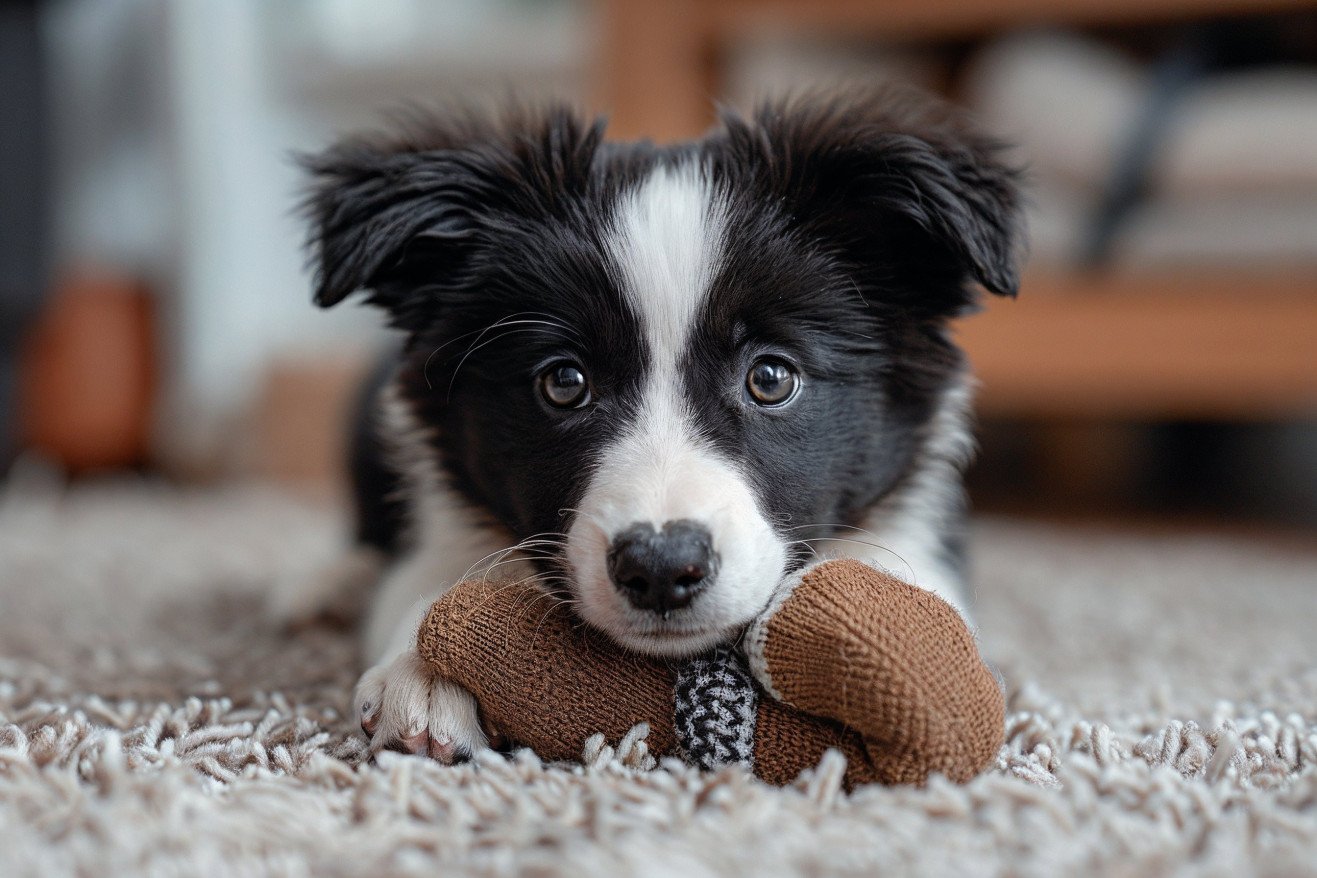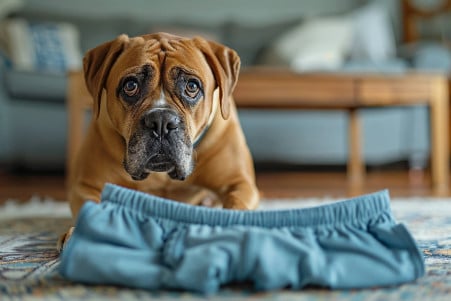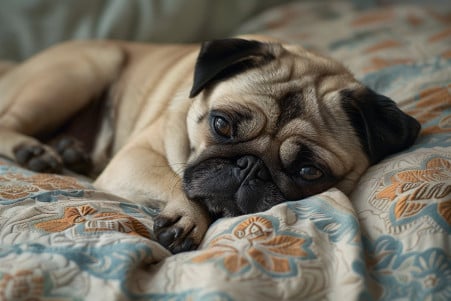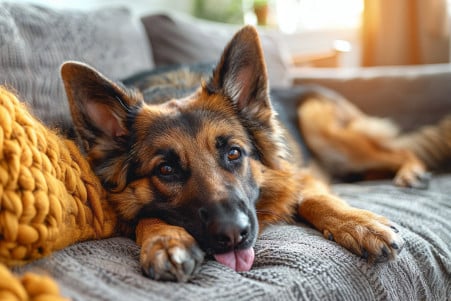Why Do Dogs Like Socks? The Science Behind Their Stinky Fascination
16 April 2024 • Updated 16 April 2024

Have you ever wondered why your dog is so interested in your dirty socks, even to the point of stealing and chewing on them? Dogs' interest in socks can be traced back to their keen sense of smell and their roots as scavengers - the combination of the sock's human scent and the stink of sweat confuses their senses and encourages them to explore further by licking, nibbling, or carrying it around.
From a review of animal behavior research to an investigation of the biological factors behind dogs' sense of smell, we'll explore scientific studies that help explain this strange but entertaining behavior. You'll come away with a better understanding of why your four-legged friend can't help but give in to the temptation of those dirty socks, further deepening the special connection between people and their pets.
Why do dogs like socks?
The Irresistible Allure: Scent and Texture
The reason dogs are so attracted to socks is because of the familiar scent of their owners, which is comforting. In fact, PetHonesty says that to your dog, your sweaty, smelly sock is like a "bottle filled with his favorite scent—you!" This connection to your scent is one of the reasons why dogs are so attracted to socks.
In addition, the texture of socks can be comforting to chew on, especially for puppies who are teething. As Wag! explains, "To a dog, socks taste good. They are chewy and the texture of the fabric feels comforting in their mouth."
That said, the fact that socks are unfamiliar may also lead dogs to chew on them out of curiosity or boredom. If they're not getting enough mental and physical stimulation, dogs may see socks as a "new and exciting adventure," according to The Farmer's Dog.
Finally, puppies and dogs may see socks as valuable 'resources' worth protecting or guarding. The Farmer's Dog explains that dogs have a "notion of a 'resource'" that they believe is "worth guarding with all their might." This could be especially true if the sock smells like their owner. By understanding these scent, texture and exploratory factors behind the sock obsession, we gain insights into our canine companions' quirky fascination.
Chewing for Comfort: A Natural Instinct
Chewing on socks and other items is a natural behavior for dogs that serves important purposes. According to Wag!, to a dog "socks taste good. They are chewy and the texture of the fabric feels comforting in their mouth." This chewing provides mental stimulation and helps keep their teeth and jaws healthy.
Chewing can also be a way for dogs to self-soothe, especially if they are experiencing boredom or separation anxiety. As The Farmer's Dog explains, dogs may chew on items that smell like their owner as a "comforting" coping mechanism when left alone. Chewing simply feels good for dogs, even if the items don't taste particularly appetizing.
This innate need to chew is deeply rooted in canine behavior. Canine Country notes that chewing "can provide your pooch with stimulation and anxiety relief" and helps keep their jaws and teeth strong and healthy. By understanding this natural tendency, we can better appreciate our dogs' fascination with socks as an extension of their instinctual chewing behaviors.
Breed Tendencies: Labradors and Pica
Labradors are one of the dog breeds with the highest tendency to eat socks and other non-food items, which is a condition known as pica. According to PetCareRx, pica is a disorder characterized by eating inedible objects. The American Kennel Club even states that Labradors are often the "most over-representative breed" when it comes to eating socks and other foreign objects.
Pica can be caused by a variety of factors, including underlying medical conditions, nutritional deficiencies, or behavioral issues, according to Pawlicy Advisor. However, dogs with pica often prefer items that smell like their owners, such as clothing or socks, which can be a comforting substitute when they're feeling anxious or bored. Knowing the breed-specific tendencies and causes of pica is important in order to prevent the dangerous consequences of eating socks.
The Risks of Sock Consumption
Eating a sock can be a medical emergency for dogs. According to Falls Village Vet Hospital, socks can lead to gastrointestinal blockages, inflammation, and other life-threatening issues. The Spruce Pets notes that "socks may seem benign enough to leave where your dog can access them. Unfortunately, due to both their linear nature and their ability to ball up, socks can easily cause gastrointestinal upset, blockages, and even septicemia and death."
Symptoms of distress include vomiting, abdominal pain, decreased appetite, and lethargy, according to Dogster. In these cases, medical treatment may be necessary, including vomiting induction, X-rays, and surgery to remove the sock, per Falls Village Vet Hospital. If a sock blockage is left untreated, it can lead to complications like intestinal rupture, dehydration, and sepsis.
This is why it's important to address this behavior. By knowing the risks of sock consumption, pet parents can work to prevent this from happening and avoid the need for medical treatment.
How to Avoid Sock Obsession: Training and Management
To avoid dogs from chewing on and eating socks, it's important to make sure that they are getting enough exercise and mental stimulation. Puppy Trained Right explains that "Dogs eat socks because they haven't been trained not to. Dogs lack boundaries and will continue eating things they shouldn't if not properly trained." The Wildest suggests increasing the amount of exercise and enrichment in a dog's daily routine to help reduce this behavior.
Training dogs to respond to commands like 'leave it' and 'drop it' can also help make sure that they can be stopped if they do get a sock, as Wag! points out. It's also important to make sure that socks are put away in a place where dogs can't get to them and to use deterrents like bitter apple spray, as suggested by Door County Pulse.
In more severe cases, it may be necessary to work with a certified trainer or behaviorist, as The Wildest recommends. However, with the right training, management, and professional intervention, dog owners can make sure that their pets don't develop a potentially life-threatening sock obsession.
Solving the Mystery of Sock Obsession in Dogs: Insights and Conclusion
Although a dog's love of socks may be funny and cute, it's also a behavior that needs to be addressed. Eating socks can result in serious medical issues and costly vet bills. As the American Kennel Club points out, pica, which is the consumption of non-food items like socks, can be harmful to dogs.
The reasons behind this behavior can range from nutritional deficiencies to medical conditions to behavioral issues like boredom and anxiety. According to PetMD, while some dog breeds may be more prone to pica, the most common reasons for the behavior are a lack of exercise and mental stimulation.
By learning about the causes of a dog's sock-eating habit and taking steps to prevent it, dog owners can help ensure their pets' safety. Meanwhile, dogs can be trained to avoid eating socks with time and effort, as discussed in this article. In general, it's important to make sure that dogs' physical and mental needs are being met to help address this worrisome behavior.


